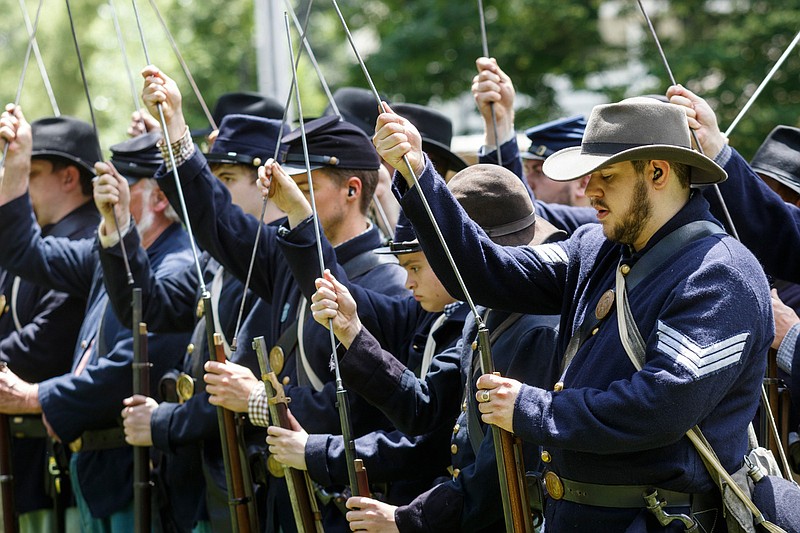I remember the Confederama. And touring battlefields in grade school, big yellow buses parked beside huge rows of wooden, rampart-like fencing. We ate sack lunches and played tag near the graves of thousands.
I remember memorizing the names of generals. And the name of Gen. Robert E. Lee's horse.
And wanting a Confederate flag.
Later, I heard stories of my maternal grandfather, a boy in Abbeville, S.C., where secession began, playing Dixie on his fiddle at a reunion of Confederate veterans.
Was it the Civil War?
Or the War of Northern Aggression?
Were the Rebels the good guys? Or the villains?
These memories were wrapped in nostalgia. And comfort. They were free of violence or wrongdoing.
Looking back, I see now clearly what was foggy at the time: I learned about the Civil War through a white lens, as if the story was only ours to tell.
"For my community, the message has long been clear: the Civil War is a story for white people - acted out by white people, on white people's terms - in which blacks feature strictly as stock characters and props," writes Ta-Nehisi Coates.
His essay - "Why Do So Few Blacks Study the Civil War?" - declares the Civil War to be a war of and for Black America; that it was a war of freedom, ending human bondage, which re-centers the war away from traditional white narratives and into Blacker ones.
"Transfixed by the war's central role in making democracy real, I have now morphed into a Civil War buff," Coates writes.
This way of seeing also points to larger questions:
How do we remember the Civil War today?
And how do we teach it?
The Civil War is part of school curriculums across the nation. How is it taught in northern university classrooms? Or in all-Black southern classrooms? Or wealthy and white private school classrooms?
A new film gives us answers by taking viewers into those very places.
It's called "Civil War (or, Who Do We Think We Are)."
The film travels the country looking into classrooms where the Civil War is taught. It's a powerful, relevant film, revealing painful amounts of both truth and delusion. This one subject - teaching the Civil War - becomes a microcosm for so much of what we face as a nation.
Emmy-nominated director Rachel Boynton talks with Black students and teachers in Mississippi. New England professors. Sons of the Confederacy who feel their world is collapsing.
And she comes to Chattanooga.
Multiple Chattanoogans are featured in the film. Dollie Hamilton and Chattanooga Connected. Chris Carpenter's Civil War classes at McCallie School. LaFrederick Thirkill. White men caretaking our city's Confederate cemetery.
Boynton is an outstanding director: probing, discerning, grounded. Her film is able to hold multiple perspectives, especially difficult ones, which offers a complex, troubling yet clarifying view of how we remember.
This week, her documentary will be screened at 7 p.m. Tuesday at the Tivoli Theatre. Afterwards, there's a panel with Boynton, Hamilton, Thirkill and Carpenter moderated by Alison Lebovitz. (You can also stream the documentary on Peacock.)
Tickets are $12 and may be purchased at tivolichattanooga.com or by calling 423-757-5580.
"Ultimately, in her delicately artful way, Ms. Boynton gets to the core problem: that, like so many things, our attitudes about the Civil War and its causes are far more personal than they are political," John Anderson writes in his Wall Street Journal review.
Please, see for yourself.
***
On Oct. 23-24, the Remote Area Medical Clinic returns to Camp Jordan Arena.
Completely free, the clinic offers life-saving, life-changing medical care, including:
- Dental care: cavities, teeth extraction, cleaning.
- Eye care: exams, prescription glasses made on site.
- Medical care: evaluation, high blood pressure and diabetes screening, mammograms, Pap smears and counseling.
The event is first-come, first-served and entirely free.
Numbers are given out beginning at 2 a.m. This is the nature of our health care system. People will travel from hundreds of miles away, arriving in the dead of night, just to get in line.
It is so merciful. No ID, no fees, no eligibility, no questions about income or insurance.
The clinic runs from 6 a.m. to 3 p.m. Oct. 23 and 6 a.m. to 1 p.m. Oct. 24.
Go to ramusa.org or call 423-813-0224 for more information.
David Cook writes a Sunday column and can be reached at dcook@timesfreepress.com.
